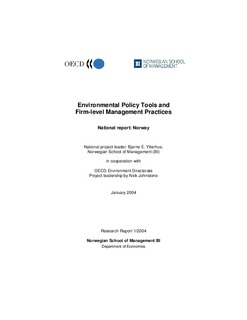Environmental policy tools and firm-level management practices: national report: Norway
Research report
Permanent lenke
http://hdl.handle.net/11250/94081Utgivelsesdato
2004Metadata
Vis full innførselSamlinger
- Research Reports [141]
Sammendrag
Objectives:
The objective of this study is to provide practical policy advice concerning the effectiveness and efficiency of alternative policy tools, including environmental management systems (EMS’s) and other programs that encourage environmental innovations. Questions to be addressed include:
- Do different types of policies (i.e. market-based measures, voluntary approaches, direct regulation) result in different organisational responses within the firm?
- How can public authorities support the introduction of management practices that lead to improved environmental performance (including innovation)?
- How can scarce public resources be better targeted to ensure that both “leaders” and “laggards” improve their environmental perfor-mance?
Context of the study:
To provide understanding of the firm’s commercial performance motivations, decision-making procedures and organisational structure when designing and implementing environmental policies, the OECD Environmental Directorate initiated a project called “Environmental Policy Design and Firm-Level Management”. This project was supported financially by OECD’s Working Party on National Environmental Policies. Seven countries have executed an industrial survey exploring the links between public (government) environmental policies and private (firm) environmental management and innovation. The participating countries were Canada, France, Germany, Hungary, Japan, Norway and the U.S.
Serie
Research Report01/2004
